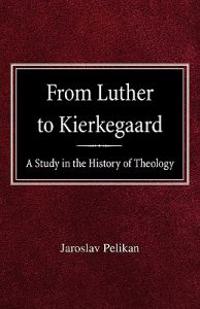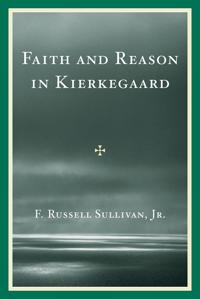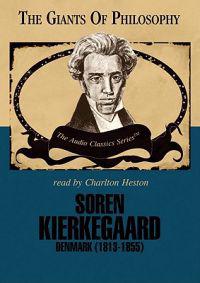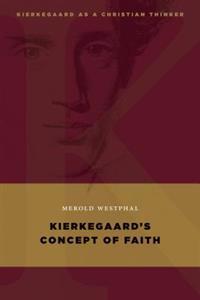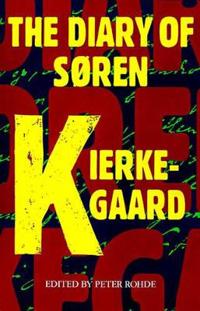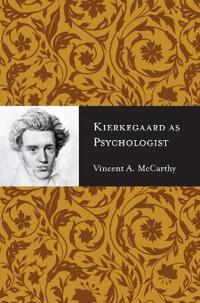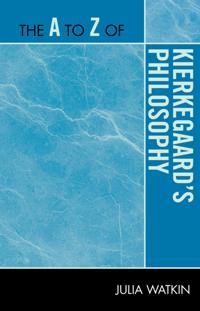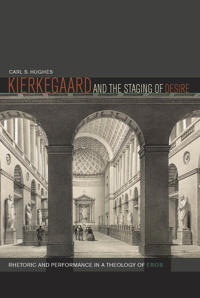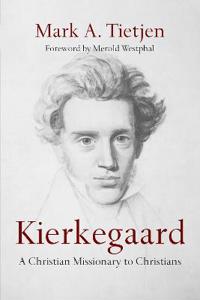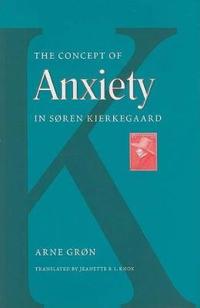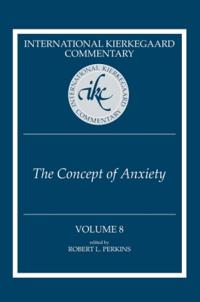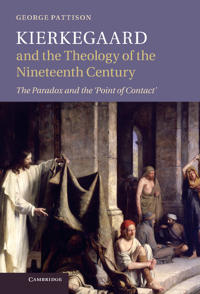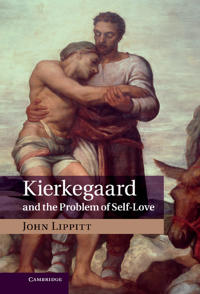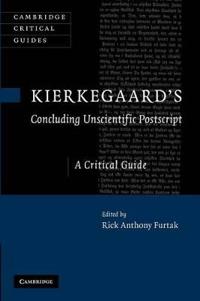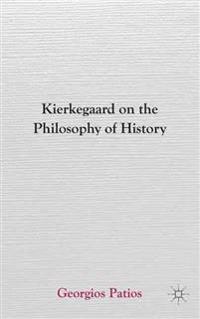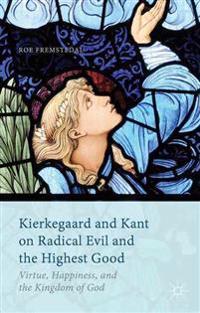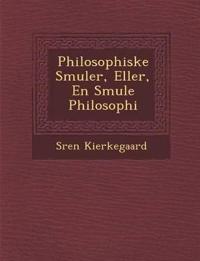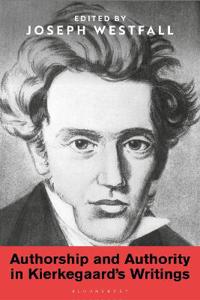Kierkegaard and His German Contemporaries (Inbunden)
ISBN: 9780754662860 - UTGIVEN: 2008-05This volume explores in detail Kierkegaard's various relations to his German contemporaries. Kierkegaard read German fluently and made extensive use of the writings of German-speaking authors. It can certainly be argued that, apart from his contemporary Danish sources, the German sources were probab[...]
From Luther to Kierkegaard: A Study in the History of Theology (Häftad)
avJaroslav Pelikan
ISBN: 9780758618276 - UTGIVEN: 1950-11Faith and Reason in Kierkegaard (Häftad)
avF. Russell Sullivan
ISBN: 9780761849346 - UTGIVEN: 200911In this work, Sullivan analyzes the relationship between faith and reason in Kierkegaard's philosophy. Kierkegaard is widely considered to be an irrationalist. Sullivan argues that he views faith as reasonable in a distinct way that must be uncovered. In some of his pseudonymous works, Kierkegaard s[...]
Kierkegaard's Concept of Faith (Pocket)
avMerold Westphal
ISBN: 9780802868060 - UTGIVEN: 2014-08In this book renowned philosopher Merold Westphal unpacks the writings of nineteenth-century thinker S ren Kierkegaard on biblical, Christian faith and its relation to reason.Across five books -- Fear and Trembling, Philosophical Fragments, Concluding Unscientific Postscript, Sickness Unto Death, an[...]
The A to Z of Kierkegaard's Philosophy (häftad)
ISBN: 9780810875845 - UTGIVEN: 2010-03The A to Z of Kierkegaard's Philosophy provides a contextual introduction to Kierkegaard's 19th century world of Copenhagen, a chronology of events and key figures in his life, as well as definitions of the key systems of his thought-theology, existentialism, literature, and psychology. The extensiv[...]
Kierkegaard and the Staging of Desire (Inbunden)
avCarl S. Hughes
ISBN: 9780823257256 - UTGIVEN: 2014-07Theology in the modern era often assumes that the consummate form of theological discourse is objective prose - ignoring or condemning apophatic traditions and the spiritual eros that drives them. For too long, Soren Kierkegaard has been read along these lines as a progenitor of twentieth-century ne[...]
Diary of a Seducer (Häftad)
avDeceased Soren Kierkegaard
ISBN: 9780826418470 - UTGIVEN: 200605Diary of a Seducer records Johannes's discovery of a girl with the Shakespearean name Cordelia, whom he sets out to control. Intricately, meticulously, cunningly, the seduction proceeds. No detail is too small to escape Johannes. "She sits on the sofa by the tea table and I sit on a chair at her sid[...]
Kierkegaard: A Christian Missionary to Christians (häftad)
ISBN: 9780830840977 - UTGIVEN: 2016-03Soren Kierkegaard (1813-1855) had a mission. The church had become weak, flabby and inconsequential. Being a Christian was more a cultural heritage than a spiritual reality. His mission reintroduce the Christian faith to Christians. How could he break through to people who were members of the church[...]
The Concept of Anxiety in Soren Kierkegaard (Inbunden)
avArne Gron, Jeanette B. L. (TRN) Knox, Arne Gron
ISBN: 9780881461268 - UTGIVEN: 2008-10This is a Danish classic available in translation. From the preface: "The Concept of Anxiety" is one of Kierkegaard's major works. It summarizes and anticipates themes that are developed in his other works, but not by presenting a unified perception. It has more the character of a work that constitu[...]
International Kierkegaard Commentary (Pocket)
avRobert L. (EDT) Perkins
ISBN: 9780881465150 - UTGIVEN: 2014-09Among the most important and intricate of all the works of Sren Kierkegaard, The Concept of Anxiety is deeply rooted in the life and personality of its author. First published in 1844 under the cryptic pseudonym Vigilius Haufniensis, The Concept of Anxiety is, according to its subtitle, A Simple Psy[...]
Kierkegaard and the Theology of the Nineteenth Century (Inbunden)
avGeorge Pattison
ISBN: 9781107018617 - UTGIVEN: 201211This study shows how Kierkegaard's mature theological writings reflect his engagement with the wide range of theological positions which he encountered as a student, including German and Danish Romanticism, Hegelianism and the writings of Fichte and Schleiermacher. George Pattison draws on both majo[...]
Kierkegaard and the Problem of Self-Love (Inbunden)
avJohn Lippitt
ISBN: 9781107035614 - UTGIVEN: 201304The problem of whether we should love ourselves - and if so how - has particular resonance within Christian thought and is an important yet underinvestigated theme in the writings of Soren Kierkegaard. In Works of Love, Kierkegaard argues that the friendships and romantic relationships which we typi[...]
Kierkegaard's "Concluding Unscientific Postscript"
ISBN: 9781107411401 - UTGIVEN: 2012-10Soren Kierkegaard's Concluding Unscientific Postscript has provoked a lively variety of divergent interpretations for a century and a half. It has been both celebrated and condemned as the chief inspiration for twentieth-century existential thought, as a subversive parody of philosophical argument, [...]
Kierkegaard and the Theology of the Nineteenth Century
ISBN: 9781107540781 - UTGIVEN: 2015-07This study shows how Kierkegaard's mature theological writings reflect his engagement with the wide range of theological positions which he encountered as a student, including German and Danish Romanticism, Hegelianism and the writings of Fichte and Schleiermacher. George Pattison draws on both majo[...]
A Companion to Kierkegaard
ISBN: 9781118783818 - UTGIVEN: 2015-12Jon Stewart, one of the world s leading experts on the work of Soren Kierkegaard, has here compiled the most comprehensive single-volume overview of Kierkegaard studies currently available. * Includes contributions from an international array of Kierkegaard scholars from across the disciplines * Cov[...]
Kierkegaard And Nietzsche On The Best Way Of Life (Inbunden)
avThomas P. Miles
ISBN: 9781137302090 - UTGIVEN: 2013-09-13Kierkegaard and Nietzsche revive an ancient approach to ethics that evaluates different ways of life considered as a whole. Comparing and contrasting their respective ideals of faith and individual sovereignty, this work reveals a valuable new path for contemporary ethics.[...]
Kierkegaard on the Philosophy of History
ISBN: 9781137383273 - UTGIVEN: 2014-04History doesn't have to mean only an effort to know the past. It can be instead, according to Kierkegaard, a willful and personal choice regarding the creation of the future. Kierkegaard offers us an amazing new approach to the problem of what is history and who makes it.[...]
Kierkegaard and Kant on Radical Evil and the Highest Good
ISBN: 9781137440877 - UTGIVEN: 2014-11Kierkegaard and Kant on Radical Evil and the Highest Good is a major study of Kierkegaard's relation to Kant that gives a comprehensive account of radical evil and the highest good, two controversial doctrines with important consequences for ethics and religion.[...]
Jung and Kierkegaard
ISBN: 9781138680272 - UTGIVEN: 2017-08Jung and Kierkegaard identifies authenticity, suffering and self-deception as the three key themes that connect the work of Carl Jung and Soren Kierkegaard. There is, in the thinking of these pioneering psychologists of the human condition, a fundamental belief in the healing potential of a religiou[...]
Philosophiske Smuler, Eller, En Smule Philosophi (Häftad)
avS¿ren Kierkegaard
ISBN: 9781288016808 - UTGIVEN: 201210Authorship and Authority in Kierkegaard's Writings
ISBN: 9781350055957 - UTGIVEN: 2018-11Authorship is a complicated subject in Kierkegaard's work, which he surely recognized, given his late attempts to explain himself in On My Work as an Author. From the use of multiple pseudonyms and antonyms, to contributions across a spectrum of media and genres, issues of authorship abound.Why did [...]


